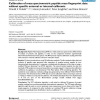Free Online Productivity Tools
i2Speak
i2Symbol
i2OCR
iTex2Img
iWeb2Print
iWeb2Shot
i2Type
iPdf2Split
iPdf2Merge
i2Bopomofo
i2Arabic
i2Style
i2Image
i2PDF
iLatex2Rtf
Sci2ools
BMCBI
2005
2005
Calibration of mass spectrometric peptide mass fingerprint data without specific external or internal calibrants
Background: Peptide Mass Fingerprinting (PMF) is a widely used mass spectrometry (MS) method of analysis of proteins and peptides. It relies on the comparison between experimentally determined and theoretical mass spectra. The PMF process requires calibration, usually performed with external or internal calibrants of known molecular masses. Results: We have introduced two novel MS calibration methods. The first method utilises the local similarity of peptide maps generated after separation of complex protein samples by twodimensional gel electrophoresis. It computes a multiple peak-list alignment of the data set using a modified Minimum Spanning Tree (MST) algorithm. The second method exploits the idea that hundreds of MS samples are measured in parallel on one sample support. It improves the calibration coefficients by applying a two-dimensional Thin Plate Splines (TPS) smoothing algorithm. We studied the novel calibration methods utilising data generated by three different MALDI-TOF...
| Added | 15 Dec 2010 |
| Updated | 15 Dec 2010 |
| Type | Journal |
| Year | 2005 |
| Where | BMCBI |
| Authors | Witold E. Wolski, Maciej Lalowski, Peter Jungblut, Knut Reinert |
Comments (0)

